Contents
Chinese, or Japanese gladiolus, also known as montbrecia or crocosmia, is a beautiful and unpretentious plant that will decorate any garden. The main advantage of this unusual plant is that it blooms from early summer to late autumn, depending on the variety. The variety of shades is also impressive. Crocosmia can bloom bright scarlet, yellow or orange flowers. However, in order for the gladiolus to take root well and please with its unusual appearance, it must be planted, observing certain rules. The same goes for care.
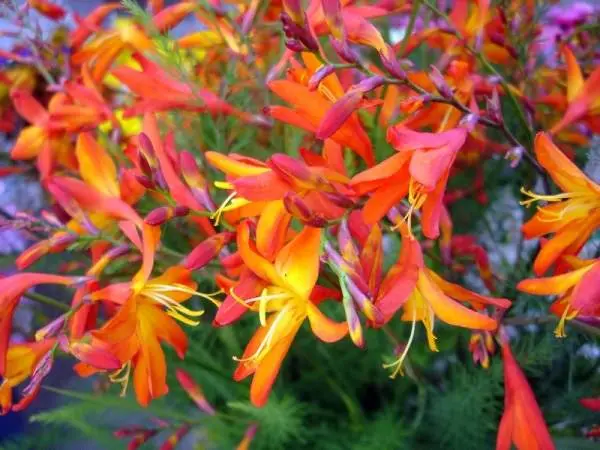
Description
The homeland of crocosmia is not at all in China, but in South Africa. The plant belongs to the iris family. “Crocosmia” in Greek means “saffron smell”, as its dry flowers smell of this noble spice. And the garden Chinese gladiolus was bred by Lemoine, a breeder from France. Sometimes the plant is called Chinese gladiolus.
The Japanese gladiolus is characterized by star-funnel-shaped flowers, collected in the form of multi-colored spikelets. Crocosmia looks great not only on the garden plot, but also in cut form. Flowers can stand in a vase without losing their charm, up to two weeks. Crocosmia looks great in combination with a sprig of asparagus. Unusual and original winter bouquets of dried montbrecia.
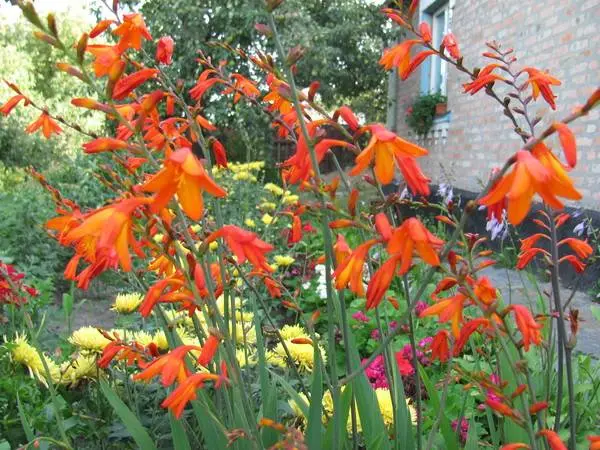
Methods of reproduction
There are two standard ways to propagate montbrecia.
- Seeds.
- Bulbs.
Seeds are sown in February-March, placing the pots in a well-lit place. By May, crocosmia grows up, and it can be planted on a bed with a clod of earth to take root better. If you are going to plant crocosmia in pots, then this can be done in the month of April. Naturally, gladioli from seeds will not immediately bloom. Flowers appear in the second or third year.
Immediately before planting in the soil, the bulbs must be kept for 2-3 days in a warm room. About 2 hours before planting, soak the bulbs in a pale pink solution of potassium permanganate. Planting depth is 5 cm.
The bulbs are planted at intervals of 10 to 12 cm. To get flowers faster, plants grown in pots are planted.
Japanese gladioli grow well in lighted areas with low groundwater. It is important that rainwater does not stagnate on the site. If you plant a montbrecia in a poorly lit area, then it may not bloom.
How to grow gladioli
Chinese crocosmia does not need frequent watering. After watering or rain, the soil must be weeded and loosened. Nitrogen mineral fertilizers accelerate the growth of Japanese gladiolus. In the summer, you can use a solution of mullein in a ratio of one to ten. Organic fertilizers can be used in parallel with potassium mineral supplements.
In late autumn, when the gladiolus has completely faded, the stem must be completely cut off. This is done for better ripening of the bulbs. This measure helps the corms to successfully endure the winter in the soil. If the region has a harsh climate, then the bulbs need to be dug closer to the onset of winter cold.
Store planting material at a temperature not higher than 10 degrees, avoiding drying out. Corms are well stored in a wooden box with sawdust. It is only necessary to first check that the sawdust is not affected by the wood-boring bug. So that the bulbs do not dry out, they are pre-moistened with a spray bottle. In warmer climates, the bulbs also overwinter in the soil. If, according to forecasts, the winter is going to be cold, then the tubers are covered with a 20-cm layer of leaves, and on top of them – with polyethylene. This protects the bulbs from freezing of the soil. In the spring, all that remains is to remove the film and rake the leaves.
The plant is resistant to diseases, it is not difficult to grow it, but pests like thrips and bears are dangerous for it. Therefore, if you want to have beautiful, healthy and intact plants on the site, destroy them.
Overview of common varieties
The most popular varieties of crocosmia are as follows:
Emily McKenzie
Ornamental plants with flowers of a brownish-orange hue, collected in a symmetrical spike. There are red spots in the center of the petals. Plant height is 60 cm. Gladiolus blooms late.
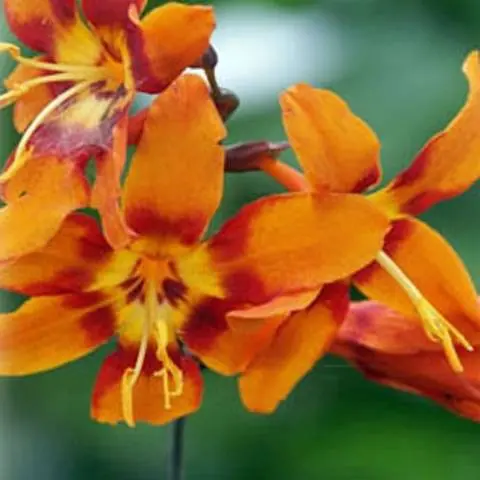 3
3
Norwich Canary
60 cm plant with yellow buds.
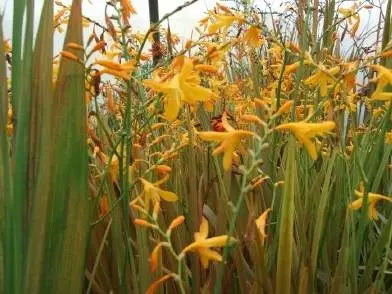
“Star of the East”
This variety is considered one of the most popular among Montbrecia, because of the unusually large and beautiful flowers. The bud is orange in color, has a star shape. Its diameter is about 10 cm. The plant is tall. Its height is about 1,0 m.
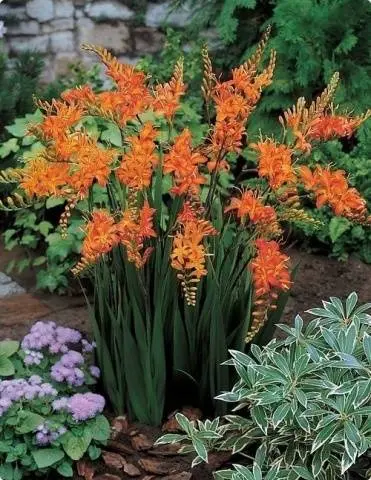
Lucifer
This variety is rightfully considered the most striking. The flowers are very beautiful, bright scarlet. The plant is tall (it happens that it has grown about 1,5 m), with a stable upright stem.
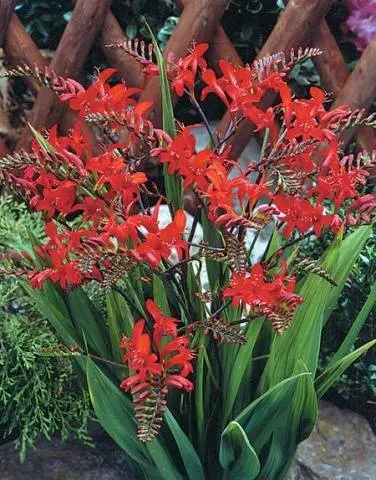
Paniculata crocosmia
The variety is characterized by early flowering (the first flowers appear in June). The plant blooms very profusely, with flowers of a bright orange hue.
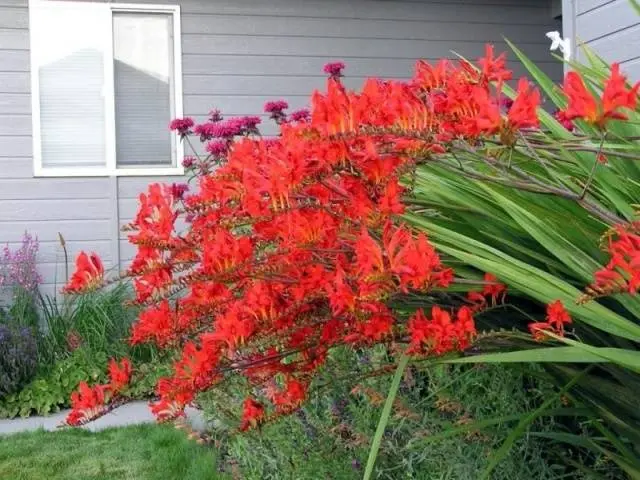
Conclusion
Montbrecia is an unusually beautiful plant. In its attractiveness, it competes even with gladiolus, because, unlike it, it is very unpretentious when grown. Chinese gladiolus looks great with other plants: cannas, dahlias, daylilies, echinacea. A group of tall Chinese gladioli looks great against the backdrop of a lawn planted with undersized plants. When choosing plants for planting, pay attention to their height. With proper care, unusually beautiful flowers will delight you for a long time.









